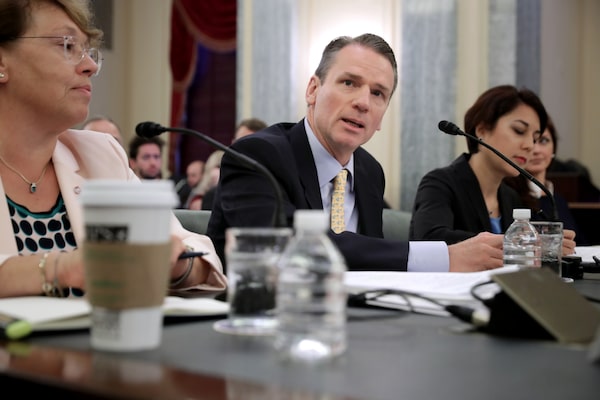
Californians for Consumer Privacy Board Chair Alastair Mactaggart, centre, testifies with European Data Protection Board Chair Andrea Jelinek, left, Georgetown Law Center on Privacy and Technology Deputy Director Laura Moy and Center for Democracy & Technology President and CEO Nuala O'Connor before the Senate Commerce, Science and Transportation Committee about consumer data privacy.Chip Somodevilla/Getty Images
Five years ago, California real estate developer Alastair Mactaggart set out on a quest that baffled his friends: He wanted to rein in the privacy-invading practices of the big technology companies, many of them based in his home state. His advocacy efforts have yielded the most wide-reaching privacy legislation in the United States – California privacy rights laws that are likely to become the de facto U.S. national standard for companies such as Facebook and Google.
So Mr. Mactaggart watched with particular interest this week as Facebook whistle-blower Frances Haugen testified before the U.S. Senate, opening a window onto how the social-media giant has used its algorithms and immense Internet reach to, she said, “harm children, stoke division and weaken our democracy.” (Facebook chief executive officer Mark Zuckerberg, in response, said the company he founded cares “deeply about issues like safety, well-being and mental health.”)
Now, Mr. Mactaggart is warning that more needs to be done. His conversation with The Globe and Mail this week has been condensed and edited for clarity.
After everything we’ve seen in the past few weeks, what other measures do you think need to be pursued in response to Internet technology companies?
Right now in the United States, it’s legal for a company to try to influence the outcome of an election. That’s the Citizens United case. If you’re a company and you give money to somebody’s campaign, then you do actually have to report that. But if a company doesn’t co-ordinate with a campaign or candidate, then they don’t have to report anything, because they’re not theoretically influencing a vote. Because there was nothing a company could do up to 10 years ago. Are they going to raise the price of gas or not stock shelves with goods?
Now, though, think what Facebook can do by influencing your feeds and changing the news that you see. Not fake news – we’re just going to show you different news. And the news we’re going to show you is going to be a preponderance of bad things about [U.S. President Joe] Biden. If they do that overtly – have a group of engineers doing it – so long as they don’t co-ordinate with the campaign, there’s no disclosure required.
The power to influence an election is extraordinary. You could even make the argument they have a fiduciary responsibility to do that – if it’s in compliance with the law and it’s in their best interest. I think that’s really dangerous.
I think right now what’s restricting them is more mores than it is law. I am concerned about that, especially when you see how repeatedly Facebook has not learned from its previous errors. If that’s the kind of company they are, what might they do in the future? Zuckerberg was literally on a companywide call where he said if [Democratic presidential hopeful Elizabeth] Warren were elected, it’s an existential threat to us. So we know he wants her not to be elected. Did you use your platform not to elect her? How would we even know?
A rule to address that could just as easily be applied to the traditional news media, no?
Well, no. If I pick up The Globe and Mail in British Columbia, theoretically it’s the same Globe and Mail as in PEI. If I’m Asian or Black or white, it’s the same Globe and Mail. The real issue here is that your experience of Facebook is totally different than mine, and they can actually change it for everybody. That’s what’s so pernicious here.
You’ve spent years thinking about privacy issues and technology companies. What stood out to you from Frances Haugen’s testimony this week?
I have a young daughter. The notion that you would be aware that your product is in many respects detrimental to young people and you would be pursuing a line of, “How do we get more young people on the product?” It really does remind you of the tobacco companies, where they were like, “We have to get young people in to get them hooked.”
Are you worried that Facebook and others will abide by the California law in California, but maintain current practices elsewhere?
I just think it’s going to be an untenable future for a company to say to a resident in Ohio, “I’m sorry, you don’t get to stop us selling your information. But your brother-in-law in Fresno, yeah – he has that right.”
In terms of protecting elections from social-media companies, what legal changes do you want to see?
The easy way to do it, which I would like to do, is to say, if you use my personal information in an attempt to change the outcome of an election, then you have to tell me. If they had to say, “We used your information to try to elect Biden,” I actually think they won’t do it, because that would be too much public criticism for them.
So I think sunlight would be the disinfectant.
Our Morning Update and Evening Update newsletters are written by Globe editors, giving you a concise summary of the day’s most important headlines. Sign up today.
 Nathan VanderKlippe
Nathan VanderKlippe